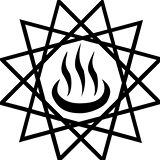by Jessi edited by Melissa
(26 Poseideon) Festival in honor of Demeter Haloa and Dionysos named after the halos (threshing floor). Although little is known about the specifics of this festival, we do know that it honored Dionysos and Demeter and appears to have been a fertility rite. It was celebrated with a feast likely held at Eleusis, with genitalia-shaped cakes, but without the foods forbidden in the Eleusinian Mysteries. After the feast women danced around a giant phallus, leaving it offerings and engaged in ritual obscenity. Men possibly held a separate festival honoring Poseidon (Parke, 98-100, 103). This festival included offerings to Poseidon Phytalmios and Persephone.
Helene P. Foley, in her background article on the Eleusinian Mysteries in her edition of The Homeric Hymn to Demeter, states that “all important rites of Demeter in Attica seem to have been linked (at least loosely) to stages of the agricultural year (p. 71). Moreover, these festivals seem to have a connection with some part of the Homeric Hymn, especially since Eleusis, which was incorporated into Attica, was the site of much of the narrative of the Hymn. Thus Haloa is part of the sacred festival cycle of grain in ancient Greece, along with the Proerosia (Oct), Thesmophoria (also Oct), the Lesser Mysteries (Feb), Thargelia (May), Skirophoria (June) and the Eleusinian Mysteries (September).
Ways to celebrate in modern times:
Sacrifice fruits to Demeter. If at all possible, use fruits that are in season—or at least imported from shorter distances. This is primarily a women’s festival and not entirely appropriate for young children because of the erotic practices. It might include a large feast with female family members and friends with cake(s) as dessert (if you can, make them in the shape of male and female genitalia), avoiding the foods forbidden at the Eleusinian mysteries (pomegranates, apples, eggs, chicken and fish, although which species of fish we aren’t sure). If possible and appropriate, include erotic entertainment and share erotic jokes. Recite the Orphic Hymns 30 and 45, Homeric Hymns I, VII and XXVI (all to Dionysos) or the Homeric Hymn 2 to Demeter, or even hymns of your own creation. Because of its proximity to the winter solstice, and because the men’s festival involved a large bonfire, it’s appropriate to celebrate with a large outdoor fire.
Modern hymns & prayers to Demeter can be found here.
Modern hymns & prayers to Dionysos can be found here.
Sources:
Foley, Helene P., ed., introduction, Homeric Hymn to Demeter, Princeton, 1994
Parke, H.W., Festivals of the Athenians, 1977
